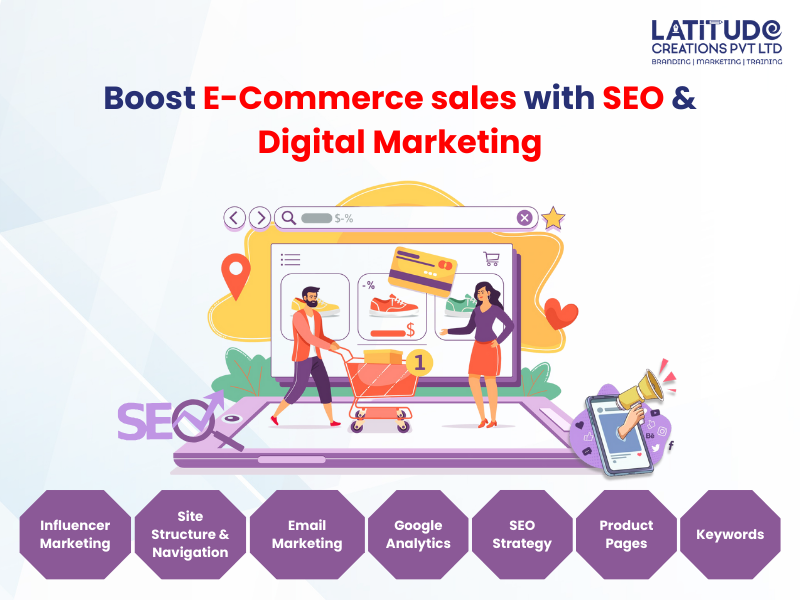Setting up powerful SEO and digital advertising techniques is essential in the fast-paced world of online trade, in which clients have quick interest spans and excessive degrees of competition.
A stable approach for e-commerce SEO should imply the difference between a developing website and one that finds it tough to gain visibility.
This comprehensive guide will explore the constantly changing relationship between digital marketing and SEO, revealing essential strategies to increase e-commerce sales.
Understanding the Power of E-commerce SEO
In the huge world of online commerce, where there is intense competition in the digital marketplace, E-commerce SEO is the crucial factor that defines successful online stores from others who find it difficult to become visible.
Beyond search engine rankings, this challenging talent is actively optimizing your digital business to draw in the proper customers, attract them with your offerings, and establish your company as an authority in the digital space.
Key Strategies to Develop E-commerce SEO
Getting your products in front of potential buyers’ eyes and making sure they stand out from the online competition is the goal of e-commerce SEO, rather than just ranking high.
So let’s take a look at some of the key strategies utilized to develop E-commerce SEO:
The key to doing well in E-commerce SEO is focusing on your product pages. Making these pages better involves paying close attention to the little details. Incorporate targeted keywords naturally within product titles, descriptions, and meta tags.
Create engaging and informative content that not only calms search engine algorithms but also resonates with your audience.
Enhancing product pages with high-quality images, detailed descriptions, and customer reviews also boosts SEO and the user experience.
- Implement Site Structure and Navigation
A well-structured website with smooth navigation is crucial for search engines to crawl and index your pages properly.
Ensure a clear hierarchy with categories, subcategories, and internal linking, facilitating easy navigation for users.
Additionally, optimize website speed and mobile responsiveness to enhance the user experience, as user-friendly websites are popular with search engines.
- Use keywords with long tails and voice search quality
Optimizing long-tail keywords and voice searches has become increasingly important.
Long-tail keywords are more specific and targeted, engaging users with specific search queries.
Optimizing voice search requires optimizing content to match natural language queries used in voice search, considering Siri, Alexa, Google Assistant- and other voice assistants.
Use tools like Google Analytics and Search Console to track and monitor SEO performance data continuously.
Analyze user behavior, organic traffic, keyword rankings, and conversion rates. Make the necessary adjustments to your content and campaigns based on these findings to keep pace with changing consumer behavior and trends.
Digital Marketing Strategies for E-Commerce Success :
Let’s dive into some key strategies that can transform your e-commerce landscape.
- Social media strategies for e-commerce growth
Implement the power of social media platforms to connect with your target audience. Share interesting content, create targeted ads, and leverage your beautiful visuals.
Platforms like Instagram and Facebook provide a direct way to exhibit your merchandise and pressure site visitors into your online store.
- Maximizing E-commerce Conversions with search engine optimization-Driven Content
Content is king within the world of e-trade, and has a large effect on conversion costs.
Create high-quality, informative content that solves customer pain areas and highlights the value of your product. This not only helps with search engine marketing but also defines your brand as an expert in the industry.
- E-commerce search engine marketing Strategy: Stay Ahead of Trends
Keep in contact with E-trade search engine marketing trends and ensure your method is adaptable to the changing instances. As search engine algorithms evolve, your strategy needs to change for this reason.
Important features that may set your eCommerce website apart from the competition include voice search functionality, mobile optimization, and user experience improvements.
- Email advertising campaigns
Use email advertising to build relationships with existing and future customers. Generate customized and targeted email campaigns to marketplace devices, offer discounts, and interact with customers.
- Influencer Marketing or Influencer Collaboration
Collaboration with influencers in your region of interest will help you reach a far larger audience. Teaming up with influencers who align with your logo values can have a massive impact on logo consciousness and sales.
Encourage influencers to create proper content material that showcases your products, reaches out to their committed fans, and creates buzz around your brand.
Integrate search engine optimization and Digital Marketing for e-commerce success:
In the ever-changing world of online marketing, an effective combination of e-commerce search engine optimization and digital marketing strategies is the key to long-term growth.
Implementing search engine optimization-pushed content material, maximizing e-trade conversions, and staying enterprise-leading are the pillars on which your achievement may be built.
Conclusion:
By following these steps, your e-commerce site can not only boost its visibility in search engine results but also develop an engaging virtual presence with your target market.
Remember that the world of search engine marketing and digital advertising and marketing constantly changes, so a proactive approach is essential for staying ahead of the curve.

